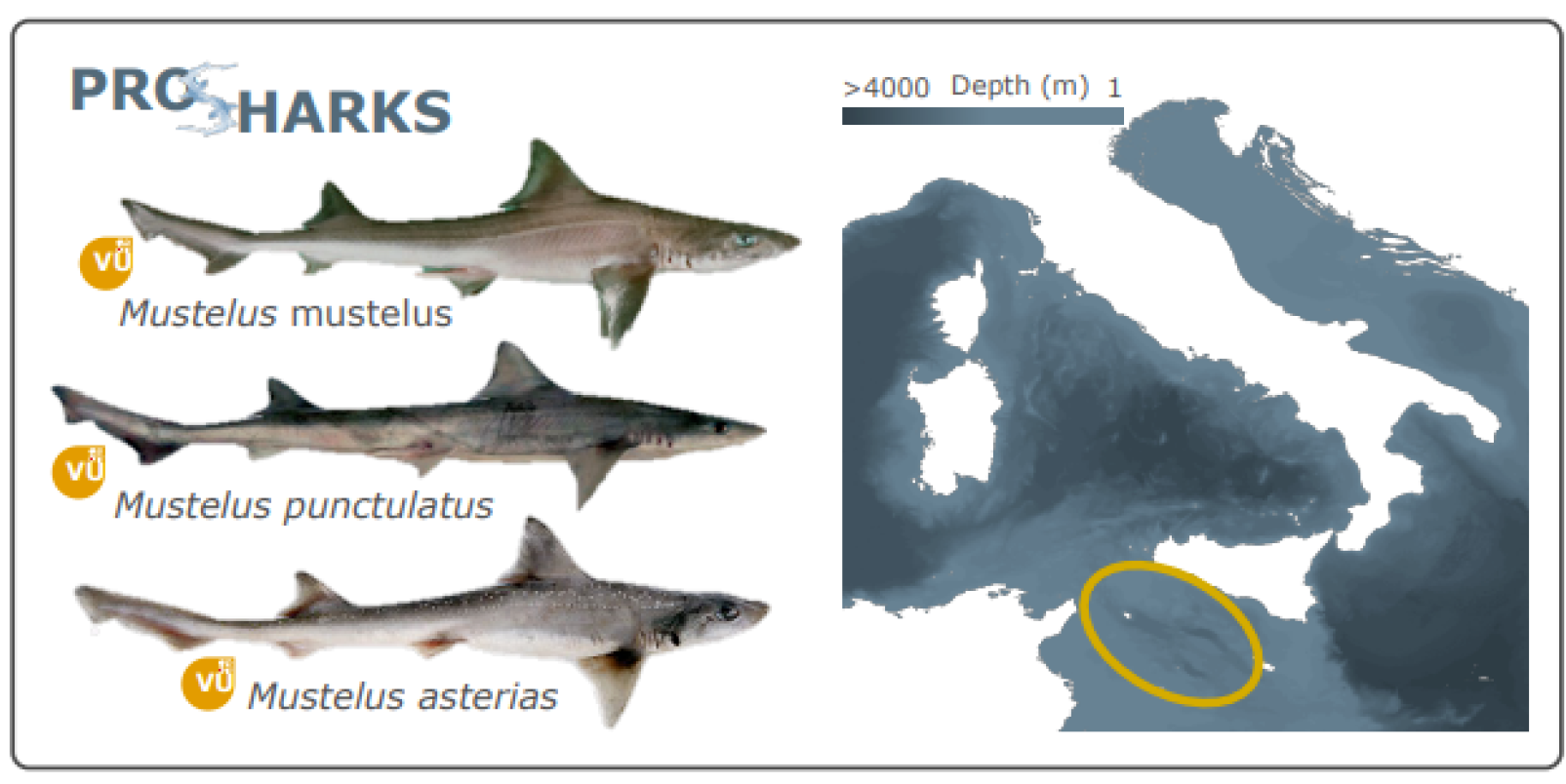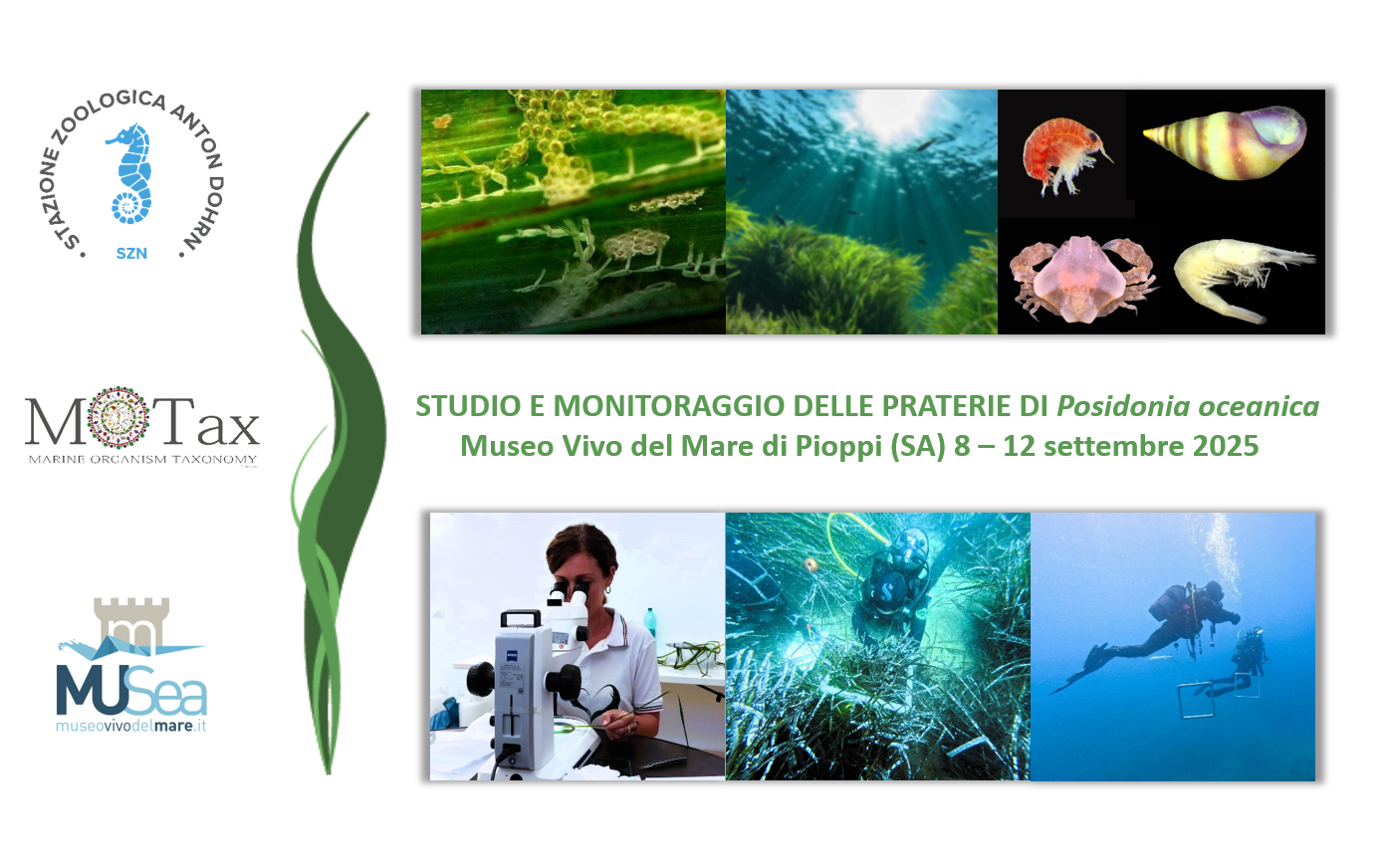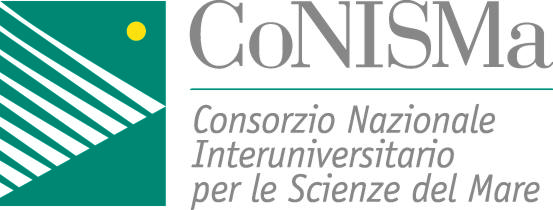A multidisciplinary approach to the study of Symbiosis in Marine ecosystems: from taxonomy to potential biotechnological applications
SymbioMar will be the second edition of the annual ‘CRIMAC International School’ and will be held from November 4th to 7th, 2025, at the Stazione Zoologica Anton Dohrn-Calabria Marine Centre (CRIMAC), located in Amendolara (CS). In alignment with the mission of the CRIMAC project— to serve as a hub for fostering exchanges between Italian and international marine research centers—this immersive event will focus on marine symbiosis: the complex interactions that shape the physiology, ecology, and evolution of marine organisms.
The international school adopts a multidisciplinary approach, covering diverse aspects of marine symbiosis, including taxonomy and evolution, biology, adaptation, climate change, ecological interactions and biotechnology. By examining these topics, the program provides a comprehensive understanding of the key factors influencing marine symbiotic relationships.
Designed to foster both theoretical knowledge and practical skills, the SymbioMar International School will offer lectures from leading experts in the field, alongside hands-on training sessions. Students will be engaged in practical activities such as applying advanced microscopy techniques, laboratory methods for extraction and sequencing, and working with bioinformatics tools to analyze various aspects of symbiosis.
The primary goal of this school is to equip the next generation of researchers with a holistic understanding of symbiosis. Participants will gain valuable skills through a multidisciplinary approach, enhancing their ability to tackle current research challenges. Moreover, it provides a unique platform for networking, allowing new connections with some of the world’s foremost experts in marine symbiosis.
The program is open to graduate students, PhD candidates, and early-career researchers with an interest not only in marine symbiosis but also in the modern techniques used to study it that can be applied in many other research fields.
Course Objective
The SymbioMar International School offers an interdisciplinary and comprehensive program focused on the study of symbiosis in marine ecosystems. By bringing together leading experts in marine biology, ecology, molecular biology, and bioinformatics, the course provides participants with in-depth knowledge of symbiotic relationships, their role in marine biodiversity, and their potential for biotechnological applications. The program emphasizes hands-on training, offering students a unique opportunity to learn advanced techniques and explore the ecological and evolutionary significance of marine symbiosis.
Theoretical Lessons
The theoretical lessons are designed to provide participants with a strong foundation in the study of marine symbiosis, covering topics such as taxonomy, evolution, host-symbiont interactions, and ecological dynamics. Key lectures include:
• Understanding the evolution of symbiotic relationships across marine ecosystems.
• Exploring how symbiosis drives biodiversity and evolutionary processes in marine life.
• Investigating the role of symbiosis in ecosystem processes and their ecological significance in marine environments.
• Examining the impact of climate change on marine partnerships.
• Exploring the potential biotechnological applications.
These lessons offer participants a deep dive into the latest research, enriching their understanding of symbiosis from multiple scientific perspectives.
Practical Lessons
The practical lessons focus on applying theoretical knowledge to real-world scenarios, with hands-on experience in the laboratory. Students will:
• Learn sediment sorting, microscopy analysis, and extraction of biological samples to study symbiotic relationships in marine organisms.
• Learn about different bioinformatics pipelines used to study microbiomes and taxonomy and evolution.
• Learn statistics for meta(prote)omics encompassing a brief intro to R, concepts, and coding.
Lecturers
Dr. Daniela Pica, Stazione Zoologica Anton Dohrn- CRIMAC, Calabria Marine Centre
Dr. Christian Galasso, Stazione Zoologica Anton Dohrn- CRIMAC, Calabria Marine Centre
Dr. Chiara Giommi, Stazione Zoologica Anton Dohrn- CRIMAC, Calabria Marine Centre
Dr. Ulisse Cardini, Stazione Zoologica Anton Dohrn, Genoa Marine Centre
Dr. Carmen Rizzo, Stazione Zoologica Anton Dohrn, Sicily Marine Centre
Dr. Maria Vittoria Modica, Stazione Zoologica Anton Dohrn, Rome – Institutional Interdepartmental Centre
Dr. Laura Núñez Pons, Stazione Zoologica Anton Dohrn
Prof. Harald Gruber-Vodicka, University Kiel (Germany)
Prof. Marco Oliverio, Università la Sapienza, Roma (Italy)
Prof. James D. Reimer University of the Ryukyus (Japan)
Prof. Paul C. Sikkel, University of Miami (USA)
Dr. Didier Aurelle, Université de Toulon (France)
Dr. Grazia Marina Quero, CNR IRBIM (Italy)
Dr. Claudia Pogoreutz, Université de Perpignan (France)
Dr. Davide Maggioni, University of Milano-Bicocca (Italy)
Prof. Davide Seveso, University of Milano-Bicocca (Italy) and MaRHE Center, Magoodhoo, Faafu (Maldives)
Dr. Silvia Bulgheresi, University of Vienna (Austria)
Dr. Tjorven Hinzke, University of Greifswald (Germany)
Dr. Claudia F. Vaga, Smithsonian Institute (USA)
Registration fee (coffee breaks, lunches, and Social Happy Hour included)
Early bird: 350€
Deadline: June 15, 2025
Regular: 400€
Deadline: July 6, 2025
Max Number of Participants: 20
Working Language: English
For more information about speakers and how to participate, visit:
https://crimacszn.com/symbiomar/
Organizing Committee
Daniela Pica, Chiara Giommi, Christian Galasso, Roberto Firmamento, Rosario Balestrieri, Salvatore Urso, Enrica Terranova, Francesca De Domenico.

Living on the extinction edge: bridging knowledge gaps to PROtect threatened coastal SHARKS in the central Mediterranean Sea
The PROSHARKS project, funded by the Ministry of University and Research (MUR) under the PRIN 2022 program, is dedicated to the conservation of demersal sharks in the Mediterranean. Specifically, PROSHARKS focuses on the three species of smooth-hound sharks (Mustelus mustelus, M. punctulatus, and M. asterias), which are currently considered at risk of extinction in the Mediterranean.
The project will investigate the population structure, connectivity, and spatial and temporal trends of these three species in the Strait of Sicily. This marine area has been globally recognized as an Important Shark and Ray Area (ISRA) by the IUCN (International Union for Conservation of Nature) due to its critical role in biodiversity and the abundance of chondrichthyan species.
PROSHARKS will adopt a multidisciplinary approach, integrating fisheries data, satellite tagging data, genetic and isotopic analyses, and local ecological knowledge (LEK) from fishermen to identify temporal trends, habitat preferences, and spatial connectivity of these species within the Strait of Sicily.
The data collected throughout the project will be used to achieve specific objectives, including:
a) Identifying key areas essential for the species' life cycles and conservation through the development of Species Distribution Models (SDMs);
b) Defining the genetic structure of populations and the connectivity between different groups within the study area (e.g., between the Italian and Tunisian coasts);
c) Assessing the impact of climate change on the future distribution of these species;
d) Defining conservation measures and raising awareness among fishermen and the general public about the ecological importance of sharks in maintaining the balance and functionality of the marine ecosystem.
The project is coordinated by the Stazione Zoologica Anton Dohrn in collaboration with the Polytechnic University of Marche and the CNR IRBIM.
What We Do
SZN coordinates the project and will be primarily involved in the tagging campaign of the species and the analysis of acquired satellite data. Additionally, it will study population trends through interviews with fishermen and identify fisheries management measures aimed at restoring the populations of gulper sharks in the Strait of Sicily.
Partners
SZN, CNR-IRBIM (Mazara del Vallo), Polytechnic University of Marche
Research Area
Marine Ecology
SZN Role
Coordinator
Principal Investigator
Francesco Colloca
Project Manager
Francesco Colloca
Project Duration
24 months: February 2025 – February 2027
Funding Institutions
MUR, PRIN 2022 Call, LS8 sector “Environmental Biology, Ecology, and Evolution”
Involved Personnel
Francesco Colloca, Principal investigator
Manfredi Di Lorenzo, Experienced Researcher
Stefano Moro, Post-doc
 L’Unità MOTax (Marine Organism Taxonomy), in collaborazione con il Museo Vivo del Mare “MUSea”, organizza la quinta edizione della Summer School: “Studio e Monitoraggio delle Praterie di Posidonia oceanica”.
L’Unità MOTax (Marine Organism Taxonomy), in collaborazione con il Museo Vivo del Mare “MUSea”, organizza la quinta edizione della Summer School: “Studio e Monitoraggio delle Praterie di Posidonia oceanica”.
Il corso prevede lezioni frontali, immersioni subacquee ed attività di laboratorio; è rivolto a chi è in possesso di un’adeguata formazione naturalistica e che intenda acquisire le conoscenze necessarie per svolgere analisi sulle praterie di Posidonia oceanica: dalla stesura del piano di campionamento a tutte le attività in mare, dalle analisi di laboratorio alle attività di elaborazione statistica dei dati.
Identificazione dei limiti della prateria, misure di densità, campionamento, fenologia, studio degli epifiti e della fauna associata, queste alcune delle attività che svolgerà il corsista acquisendo manualità e metodologie per il monitoraggio delle praterie.
La Summer School si prefigge l’ulteriore obiettivo di formare i partecipanti all’applicazione della metodologia PREI, Posidonia Rapid Easy Index, strumento metodologico d’indagine dello stato delle praterie di Posidonia oceanica per l’implementazione territoriale delle Direttive Comunitarie Direttiva Quadro Sulle Acque (2000/60/CE) e Direttiva Strategia Marina (2008/56/CE), ISPRA.
Il corso, diretto dal dott. Luigi Valiante direttore scientifico del Museo Vivo del Mare, si avvale della collaborazione della Stazione Zoologica Anton Dohrn con la partecipazione del dott. Gabriele Procaccini Dirigente di Ricerca del Dipartimento Ecologia Marina Integrata e del dott. Paolo Fasciglione dell’Unità specializzata in tassonomia MOTax.
La durata è di 5 giorni, le lezioni frontali e le attività di laboratorio si svolgono presso il Museo Vivo del Mare “MUSea” che ha sede al Palazzo Vinciprova di Pioppi (Pollica, SA), mentre le attività di campo (immersioni subacquee) saranno effettuate nell’Area a Tutela “la Punta” di Pioppi, nel Parco Nazionale del Cilento, Vallo di Diano e degli Alburni.
Lezioni frontali:
• Fisiologia, ecologia, ruolo ecosistemico, gestione della fascia costiera, conservazione
• Resilienza e capacità di adattamento
• Analisi dei dati, applicazione dell’indice PREI con dimostrazioni pratiche
Immersioni subacquee sulla prateria:
• Identificazione dei descrittori fisiografici (tipologia prateria e sua distribuzione, identificazione limiti superiore ed inferiore e tipologia)
• Descrittori strutturali (misure di densità e valutazione dell’indice di copertura)
• Tecniche di campionamento e prelievo dei fasci fogliari
• Campionamento della fauna associata ai rizomi (sorbona)
• Campionamento della fauna vagile associata alle foglie (retino manicato)
Attività di laboratorio:
• Descrittori morfometrici (fenologia)
• Analisi della comunità epifita
• Studio della fauna vagile
Docenti
• Luigi Valiante (Museo Vivo del Mare di Pioppi)
• Gabriele Procaccini (Stazione Zoologica Anton Dohrn Napoli)
• Paolo Fasciglione (Stazione Zoologica Anton Dohrn Napoli)
• Michele Scardi (Università degli Studi di Roma Tor Vergata)
Quota di partecipazione:
450,00 euro, la quota comprende:
5 gg di corso presso il Museo Vivo del Mare di Pioppi (Palazzo Vinciprova):
• attività scientifiche in immersione sulla prateria di Posidonia oceanica;
• attività di laboratorio presso le sale attrezzate del Centro Velico Anemos di Pioppi;
• lezioni frontali da parte del personale scientifico;
• materiale didattico;
• cena sociale/coffee break
BORSA DI STUDIO EUGENIO FRESI
Per il 2025 sono previste due borse di studio per la partecipazione al corso finanziate dal Rotary Club di Battipaglia.
Invio candidature, modalità di partecipazione alle borse ed un "ricordo" del professore Eugenio Fresi al link sotto:
allegato con il bando
Scadenza presentazione domande per la partecipazione alle borse 31 maggio 2025
Organizzatori: Paolo Fasciglione (SZN), Luigi Maria Valiante (MUSea)
Info e domanda di partecipazione alla summer school:
• www.centrostudisealab.it
• This email address is being protected from spambots. You need JavaScript enabled to view it.
• This email address is being protected from spambots. You need JavaScript enabled to view it.
Fine iscrizioni: 15 luglio 2025
Conferma partecipazione e pagamento: 31 luglio 2025


Stazione Zoologica Anton Dohrn is pleased to honor the memory of Aldo Fasolo and Paolo Brancaccio through two prestigious awards dedicated to young researchers. These recognitions represent a tribute and an incentive for the new generations of scientists.
The awards aim to enhance excellence in research by promoting innovation and critical thinking. They are aimed at young scholars who, with their work, demonstrate dedication and passion for science, embodying the values and legacy of Fasolo and Brancaccio.
Discover the details on how to participate, the selection criteria and the deadlines to submit your application.













